Mazda CX-60 VS DS Automobiles DS 7 – Specs, Efficiency & Price Comparison
Which model is the better choice – the Mazda CX-60 or the DS Automobiles DS 7? We compare performance (327 HP vs 360 HP), boot capacity (570 L vs 555 L), efficiency (1.40 L vs 1.30 L), and of course, the price (41100 £ vs 41300 £).
Find out now which car fits your needs better!
The Mazda CX-60 (SUV) is powered by a Plugin Hybrid or Diesel MHEV engine and comes with a Automatic transmission. In comparison, the DS Automobiles DS 7 (SUV) features a Diesel or Plugin Hybrid engine and a Automatic gearbox.
When it comes to boot capacity, the Mazda CX-60 offers 570 L, while the DS Automobiles DS 7 provides 555 L – depending on what matters most to you. If you’re looking for more power, you’ll need to decide whether the 327 HP of the Mazda CX-60 or the 360 HP of the DS Automobiles DS 7 suits your needs better.
There are also differences in efficiency: 1.40 L vs 1.30 L. In terms of price, the Mazda CX-60 starts at 41100 £, while the DS Automobiles DS 7 is available from 41300 £.
Compare all the key specs now and find out which model fits your lifestyle best!
In the crossover segment, the DS 7 Crossback dazzles with its sophisticated French flair, offering a plush interior filled with high-end materials and state-of-the-art technology. Meanwhile, the Mazda CX-60 stands out with its driver-focused performance and sleek Japanese design, offering an engaging driving experience that enthusiasts appreciate. Both models cater to diverse tastes, with the DS 7 Crossback appealing to those who prioritize luxury and comfort, while the CX-60 attracts drivers who value a dynamic connection to the road.
Mazda CX-60
The Mazda CX-60 exudes a sense of elegance and sophistication with its sleek design and refined styling. Inside, the cabin offers a harmonious blend of comfort and advanced technology, ensuring an enjoyable driving experience. On the road, the CX-60 delivers impressive performance and handling, making it a standout choice for those who appreciate driving dynamics.
details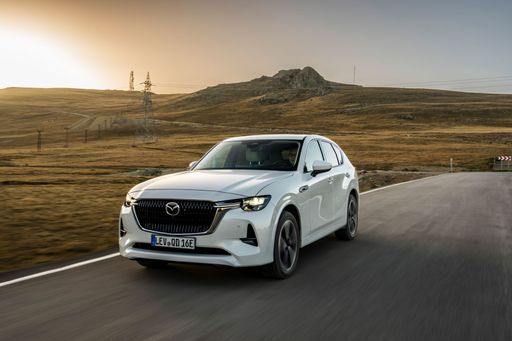 @ de.mazda-press.com
@ de.mazda-press.com
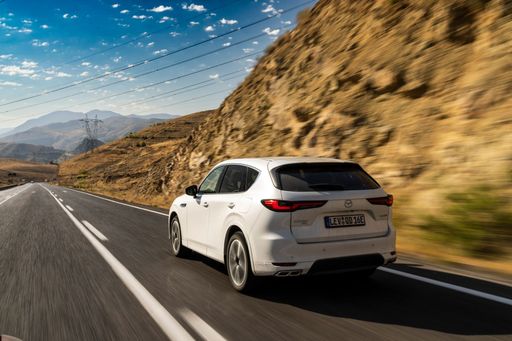 @ de.mazda-press.com
@ de.mazda-press.com
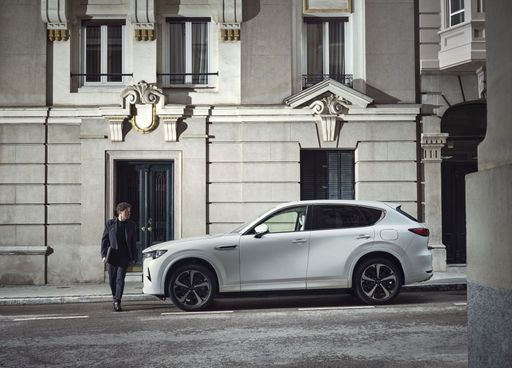 @ de.mazda-press.com
@ de.mazda-press.com
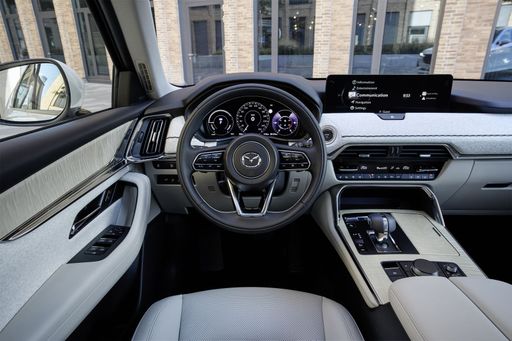 @ de.mazda-press.com
@ de.mazda-press.com
DS Automobiles DS 7
The DS 7 stands out with its striking design and luxurious comfort, making it a true embodiment of French elegance in the SUV segment. Inside, the cabin showcases a blend of high-quality materials and innovative features that cater to both driver and passenger needs. With its impressive road presence and refined driving dynamics, the DS 7 promises a captivating driving experience that doesn't compromise on style.
details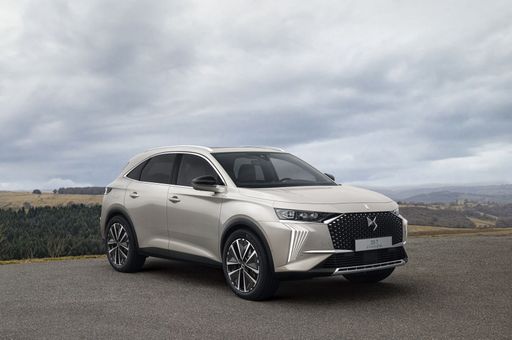 @ media.stellantis.com
@ media.stellantis.com
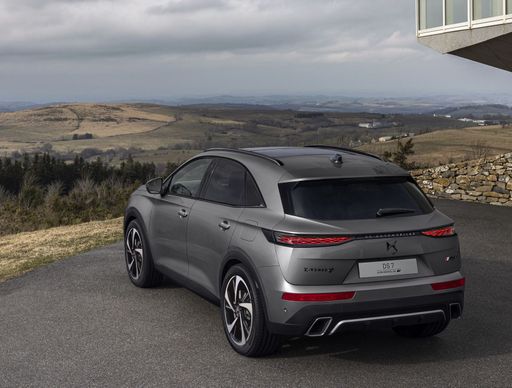 @ media.stellantis.com
@ media.stellantis.com
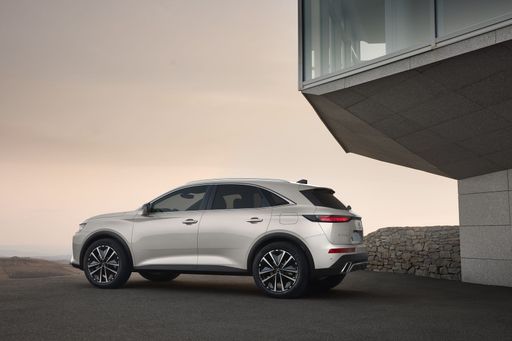 @ media.stellantis.com
@ media.stellantis.com
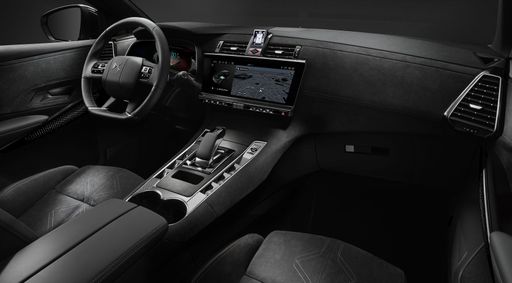 @ media.stellantis.com
@ media.stellantis.com
The Luxe of the Urban Jungle: DS 7 Crossback vs Mazda CX-60
In a market dominated by SUVs, the DS 7 Crossback and the Mazda CX-60 stand out with their unique approaches to luxury, performance, and innovation. This comparative analysis delves into the technical marvels and design philosophies that set these two apart in the crowded automotive landscape.
Design and Luxury: Sophistication Meets Innovation
The DS 7 Crossback radiates with French elegance, showcasing a streamlined design with intricate detailing. With dimensions of 4593 mm in length, 1891 mm in width, and a height of 1625 mm, it strikes a balance between urban agility and road presence. The interiors promise premium comfort, offering seating for five adorned with high-quality materials.
In contrast, the Mazda CX-60 exudes a rugged elegance, slightly larger with a length of 4745 mm, width of 1890 mm, and variable height up to 1688 mm. Its cabin design leans towards a minimalist aesthetic, providing spacious seating for five and emphasizing driver-centric ergonomics. This focus creates a harmonious blend of utility and style.
Engine Dynamics: Power and Efficiency
When it comes to powertrains, the DS 7 Crossback offers a diverse range. It includes diesel and plug-in hybrid options with power outputs between 130 to 360 HP, seamlessly powered through an automatic transmission. These engines ensure a quick response with impressive fuel efficiencies, where the hybrid models deliver an astonishing consumption as low as 1.3 L/100km and a CO2 emission range from 30 to 145 g/km.
The Mazda CX-60 steps up with both plug-in hybrid and diesel MHEV engines, offering between 200 to 327 HP. Impressively, the plug-in hybrid holds an electric range of 64 km, close to the DS 7's 65 km. Despite its larger size, the CX-60 maintains an efficient consumption of around 1.4 L/100km for its hybrid model. The CO2 emissions are competitively low, ranging between 31 to 139 g/km, emphasizing Mazda's commitment to eco-friendly performance.
Performance and Handling: The Art of the Ride
Performance figures reveal the DS 7 Crossback's versatility, especially with its hybrid variants achieving 0-100 km/h in just 5.7 seconds, and reaching top speeds up to 235 km/h. Its torque spans from 300 to 520 Nm, providing a dynamic driving experience in all scenarios, supported by optional front-wheel or all-wheel drive systems.
The Mazda CX-60 doesn't lag far behind, pushing from 0 to 100 km/h in as little as 5.8 seconds and achieving a top speed of 219 km/h. With torque options extending up to 550 Nm, its all-wheel and rear-wheel drive configurations ensure stable and exhilarating performances, even through the most challenging terrains.
Practicality and Usability: Making Every Journey Count
Both vehicles shine in practicality. The DS 7 Crossback offers a generous trunk capacity of 555 liters, while the Mazda CX-60 surpasses slightly with 570 liters, ideal for family outings or significant hauls. Fuel tanks are sized well for extended travels, and both models include standard five-door configurations that enhance accessibility and convenience.
Conclusion: The Choice of Distinction
In the battle of DS 7 Crossback versus Mazda CX-60, the decision ultimately rests on personal preference and priorities. The DS 7 Crossback seduces with its refined elegance and efficient hybrid technology, perfect for those valuing urban sophistication. Meanwhile, the Mazda CX-60 appeals to adventure seekers who admire performance and practicality blended with pioneering eco-conscious engineering. Both SUVs mark their territories in style, leaving a bold imprint on every road traveled.

|

|
|
|
|
Costs and Consumption |
|
|---|---|
|
Price
41100 - 56100 £
|
Price
41300 - 58500 £
|
|
Consumption L/100km
1.4 - 5.4 L
|
Consumption L/100km
1.3 - 5.5 L
|
|
Consumption kWh/100km
-
|
Consumption kWh/100km
-
|
|
Electric Range
64 km
|
Electric Range
57 - 65 km
|
|
Battery Capacity
-
|
Battery Capacity
12.90 kWh
|
|
co2
31 - 139 g/km
|
co2
30 - 145 g/km
|
|
Fuel tank capacity
50 - 58 L
|
Fuel tank capacity
43 - 55 L
|
Dimensions and Body |
|
|---|---|
|
Body Type
SUV
|
Body Type
SUV
|
|
Seats
5
|
Seats
5
|
|
Doors
5
|
Doors
5
|
|
Curb weight
1890 - 2055 kg
|
Curb weight
1651 - 2002 kg
|
|
Trunk capacity
570 L
|
Trunk capacity
555 L
|
|
Length
4745 mm
|
Length
4593 mm
|
|
Width
1890 mm
|
Width
1891 mm
|
|
Height
1680 - 1688 mm
|
Height
1625 mm
|
|
Payload
581 - 612 kg
|
Payload
398 - 424 kg
|
Engine and Performance |
|
|---|---|
|
Engine Type
Plugin Hybrid, Diesel MHEV
|
Engine Type
Diesel, Plugin Hybrid
|
|
Transmission
Automatic
|
Transmission
Automatic
|
|
Transmission Detail
Automatikgetriebe
|
Transmission Detail
Automatikgetriebe
|
|
Drive Type
All-Wheel Drive, Rear-Wheel Drive
|
Drive Type
Front-Wheel Drive, All-Wheel Drive
|
|
Power HP
200 - 327 HP
|
Power HP
130 - 360 HP
|
|
Acceleration 0-100km/h
5.8 - 8.4 s
|
Acceleration 0-100km/h
5.7 - 11.9 s
|
|
Max Speed
200 - 219 km/h
|
Max Speed
195 - 235 km/h
|
|
Torque
450 - 550 Nm
|
Torque
300 - 520 Nm
|
|
Number of Cylinders
4 - 6
|
Number of Cylinders
4
|
|
Power kW
147 - 241 kW
|
Power kW
96 - 265 kW
|
|
Engine capacity
2488 - 3283 cm3
|
Engine capacity
1499 - 1598 cm3
|
General |
|
|---|---|
|
Model Year
2024
|
Model Year
2024 - 2025
|
|
CO2 Efficiency Class
B, D, E
|
CO2 Efficiency Class
E, B
|
|
Brand
Mazda
|
Brand
DS Automobiles
|
Mazda CX-60
The Allure of the Mazda CX-60
Exploring the burgeoning SUV market, the Mazda CX-60 presents itself as a unique contender by combining sophisticated design, powerful performance, and pioneering technology. This British article delves into the detailed intricacies of the CX-60, providing an all-encompassing view of what makes this model stand out.
Engines That Lead the Class
The Mazda CX-60 comes equipped with a choice of pioneering engines including the Plug-in Hybrid and Diesel Mild-Hybrid. Whether you prefer the dynamic 327 PS earmarked with the Plug-in Hybrid or the reliable Diesel option delivering up to 254 PS, the range satisfies a diverse array of performance needs. These engines marry power with efficiency as evidenced by fuel consumptions ranging from as low as 1.4 L/100km to 5.4 L/100km—a remarkable feat in the SUV category.
Plug-In Hybrid: A Modern Marvel
The Plug-in Hybrid engine grabs attention with its e-Skyactiv technology, allowing for an electric range of 64 km, making short urban journeys effortlessly emission-free. Paired with an automatic all-wheel drive system, it provides swift acceleration from 0-100 km/h in just 5.8 seconds, while boasting a fuel efficiency that sets a new standard in hybrid innovation.
Diesel Option for the Road Warriors
For enthusiasts who crave longer journeys, the Diesel Mild-Hybrid variant stands steady. Available in both rear-wheel and all-wheel drive configurations, this engine combines an optimal balance of performance and economy. The most robust option, powered by a 3.3-litre six-cylinder formation, is engineered to deliver a smooth ride with a refined power output.
Interiors Crafted for Comfort
The Mazda CX-60 reveals an interior that speaks of luxury and meticulous craftsmanship. With seating for five, the cabin area is accentuated by options including the Takumi line, which couples elegant design with modern technology. Emphasising driver and passenger comfort, the seating materials and arrangement reflect Mazda's dedication to excellence and ergonomics.
Technological Triumphs
At the heart of Mazda's innovation, the CX-60 incorporates a series of technology enhancements aimed at elevating the driving experience. The inclusion of advanced safety features provides reassurance while cutting-edge infotainment systems ensure connectivity without compromising on design.
The Bottom Line
The Mazda CX-60, with a price range of €47,390 to €61,550, offers tremendous value for an SUV of its class. With a clever mix of technology, style, and performance, it becomes clear why this model is leading its segment. Its blend of dynamic powertrains, premium features, and innovative technology make it an enticing option for those in pursuit of a modern SUV.
Final Thoughts
With its captivating design and exemplary features, the Mazda CX-60 not only meets but exceeds the expectations of contemporary SUV enthusiasts. As Mazda continues to refine its vehicle lineup, the CX-60 stands as a testament to their commitment to creating vehicles that deliver both satisfaction and sustainability.
DS Automobiles DS 7
The DS 7: A Luxurious SUV Experience
The DS 7 has firmly established its presence in the luxury SUV segment since its launch. Combining elegant design with cutting-edge technology, it stands out as a symbol of sophistication and performance. This SUV from DS Automobiles is designed to meet the demands of modern drivers seeking a compelling blend of luxury, comfort, and efficiency.
Elegance Meets Performance
The DS 7 is available in various powertrains, including efficient diesel and innovative plug-in hybrid systems. The lineup features the DS 7 BlueHDi 130 Diesel Automatic Front-Wheel Drive, offering a robust 130 HP and a remarkable fuel consumption of just 5.5 L/100 km. For those who crave electrification, the DS 7 E-Tense series includes a range of powerful hybrid options, such as the 225 HP variant, presenting an electric range of 65 km, making it a perfect choice for urban driving.
Advanced Hybrid Technology
Among the most impressive offerings is the DS 7 E-Tense 300 Plugin Hybrid Automatic All-Wheel Drive, which delivers a powerful 300 HP, while maintaining exceptional efficiency. This model can accelerate from 0 to 100 km/h in just 5.9 seconds, showcasing not only its sporty character but also its driveability. The integration of a 1.3 L engine and a battery capacity of 12.9 kWh ensures that it efficiently meets the needs of eco-conscious drivers without compromising on performance.
Luxurious Interior and Comfort Features
Stepping inside the DS 7 feels like entering a realm of pure luxury. The interior is finely crafted with high-quality materials and meticulous attention to detail, offering spacious seating for up to five passengers. The cabin is oriented towards providing a serene driving experience, with a trunk capacity of 555 liters, ensuring ample space for luggage. Moreover, the inclusion of state-of-the-art infotainment features enhances both driver and passenger connectivity.
Safety and Driver Assistance Innovations
Safety is a top priority for DS Automobiles, and the DS 7 reflects this commitment. It is equipped with an array of driver assistance systems, including adaptive cruise control, lane departure warning, and automatic emergency braking. These advanced technologies not only elevate the driving experience but also provide peace of mind, ensuring safer journeys on all roads.
Distinctive Trim Levels to Suit Every Taste
The DS 7 is available in various trims, including the exclusive Collection "Antoine de Saint Exupéry" and elegant Pallas variants. Each trim level is designed to cater to diverse preferences, offering unique styles and additional features to enhance the driving experience. From luxury finishes to high-tech enhancements, there’s a tailored DS 7 for everyone.
A Commitment to Sustainability
With an eye toward environmental responsibility, the DS 7 hybrid models boast impressive CO2 emissions figures, with the E-Tense variants emitting as low as 30 g/km. This commitment to sustainability, combined with high levels of performance, makes the DS 7 a forward-thinking choice in the luxury SUV market.
Conclusion: A Class Apart
In conclusion, the DS 7 encapsulates the essence of luxury and modern innovation in the SUV category. Its stunning design, advanced technologies, and array of powerful engines make it a noteworthy contender for anyone seeking an upscale driving experience. As drivers increasingly prioritize sustainability without sacrificing performance, the DS 7 firmly positions itself to meet these evolving demands.
The prices and data displayed are estimates based on German list prices and may vary by country. This information is not legally binding.
